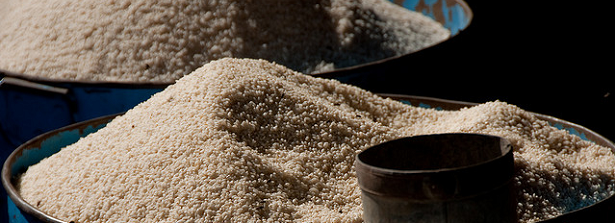Enhancing Rice Markets in Uganda through Smart Micronutrient Fertilization (ENRICH)

Duration: January 2016 – January 2019. This project has been finalized.
Project information
Aim: Rice is an important crop with rapidly growing demand in Uganda. 90% of the increased production resulted from land expansion, while yields remained stagnant. Fertilizers are barely used and yield responses to conventional NPK-fertilizers are poor. On-farm trials reveal that addition of micronutrients to NPK significantly increases yields. The benefits from adding micronutrients include increased yield, improved grain quality, increased uptake efficiency of NPK-fertilizers and increased economic returns. These mutually reinforcing benefits may incentivise farmers to buy and use fertilizers. Yet, uptake efficiency of soil applied micronutrients is low. Innovations in nutrient packaging and delivery mechanisms are needed. Foliar application and nano-packaging both show promising potential to increase plant uptake. The aim of this project is to fine-tune the composition of micronutrients required and their mode of application to realize multiple benefits.
Objective: The main objective of this project is to increase food security and income of smallholder farmers producing lowland rice with the main objective to significantly increase the productivity of lowland rice in Eastern and Northern Uganda. Specific objectives are:
- Understand the current situation and rice fertility challenges in the region.
- Evaluate and identify the appropriate composition and mode of application of micronutrients (SmartFert) for optimum yield of lowland rice.
- Integrate and out scale SmartFert into ongoing development programs and production practices, and support institutional and research capacity for rice sector development.
Method: Findings of the project will be disseminated throughout the value chain, and policymakers will be informed to be able to create an enabling environment for further development.
Country: Uganda.
Dutch policy goals: Increased sustainable agricultural production; and Improved access to better nutrition.
Progress reports
Year 1: Rice is a very important crop for the smallholder farmers in Uganda. However yields are very low (2.5t/ha). ENRICH aims to increase food, nutrition and income security of smallholder lowland rice farmers through testing and recommending best micronutrient and NPK fertilizer management strategies for optimum yields and nutritional quality. Preliminary results conducted in partnership with Farmers’ Research Groups (FRGs) at Doho and Kibimba, Eastern Uganda indicate that additional average yield increment of 0.76t/ha can be obtained when micronutrients are applied in combination with NPK, bringing in additional $434/ha for a farmer who has been using NPK alone. However, an average yield increment of 2.41t/ha, equivalent to an additional $1,377/ha can be achieved when a farmer who has not been using any fertilizer at all, adopts best NPK and micronutrient fertilizer strategies. Through workshops and farmers’ field days, stakeholders are greatly interested and keen to try the technologies on their own.
Year 2: Rice is an important food staple and a major source of income among smallholder farmers in Uganda, however, yields are low (2.5t/ha). ENRICH therefore, aims to increase food, nutrition and income security of smallholder lowland rice farmers through testing and recommending best micro-macronutrient fertilizer strategies for optimum yields and nutritional quality. Preliminary results of field trials conducted with participation of Farmers’ Research Groups (FRGs) show an average yield increment of 2.41t/ha (1st trial) when a farmer who has not been using any fertilizer, adopts best NPK and micronutrient fertilizer strategies and, good agricultural practices. Through trainings and participation in the fertilizer trials, some farmers have already begun to apply the knowledge and, yield increase of up to 1.5t/ha reported with fertilizer use. The findings have generated great interest from all stakeholders in the rice value chain; who are keenly waiting for the best fertilizer management option(s) to be recommended for adoption.
Final report
Summary of the results: The project aimed to increase food, nutrition and income security of smallholder rice farmers through testing micro- and macronutrient (NPK) fertilization strategies for optimum yields and nutritional quality. Researcher-led omission trials of different micro-macronutrient fertilizer combinations and application methods (soil/foliar) were conducted in two agro-ecologies and growing seasons, with participation of Farmer Research Groups.
Mean grain yield increases due to NPK application over the 1st and 2nd seasons, respectively, were 33% and 92%, and increased to 40% and 118% with micronutrients. Due to variability, effects of micronutrients were not statistically significant but their addition to NPK can provide $100 additional net profit. On-farm trial analyses revealed good agricultural practices (GAPs) as key in improving rice yields under current soil conditions. Farmer-led on-farm trial results showed that farmers realize a 7% yield gain over control when they use GAPs, but no yield increase with their selection of GAPs and nitrogen dose. Use of GAPs + NPK resulted in a 25% yield increase over control. These results suggest that farmers must use GAPs first and adequate fertilizer amounts thereafter to realize better yields. Soil maps showing micro-macronutrient contents were made for Uganda that allow information from the trials to be extended to other rice-growing areas.

